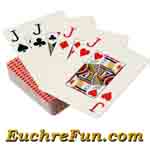
|
| « Games Index | History of Playing Cards | Early Standards | Gallery of Playing Cards | Card Backs |
Bourré
Bourré is a simple trick taking game. It is a gambling game which originated in France and is today popular in Louisiana, USA.
Players and Cards
The game is best for seven players. Any number from two to eight can play, but with fewer than about five players the game becomes less interesting. A standard deck of 52 cards is used and the cards rank from high to low A-K-Q-J-10-9-8-7-6-5-4-3-2.
Ante and Deal
Deal and play are clockwise and the deal passes to the left after each hand.
Before the first deal each player must contribute an ante of one chip to the pot. Thereafter the dealer may set the ante. Before subsequent deals, certain players may not have to contribute an ante, depending on the result of the previous hand.
Any player who wishes to may shuffle and the dealer has the right to shuffle last. The cards must then be cut by the player to dealer's right.
Each player receives 5 cards, dealt one at a time face down except the Dealer’s 5th and last card. This is turned up and indicates the suit for Trumps.
Draw or Pass
Players pick up their cards and look at them, but may not show their cards to anyone else.
Beginning with the player to dealer's left, each player in turn declares whether he/she will pass or play, and if playing, how many cards he/she wishes to discard.
It is important to wait your turn to indicate your decision, and not make any premature announcement or gesture indicating your intentions, nor the number of cards you wish to discard. If you do so, the penalty is to forfeit your next turn to deal.
- If you pass, you stack your cards face down in front of you. You take no further part in play, you do not incur any further obligations, and you forfeit your chance to win the pot.
- If you play, you may discard some or all of your cards face down, announcing the number you are discarding. The dealer then deals you an equal number of replacement cards from the top of the deck. You may also stand pat, which means you don’t discard anything.
It may happen, especially in an eight-player game, that the dealer runs out of cards to deal before everyone gets their replacements. In such a case the dealer gathers up all the unused and discarded cards, but not the discards of the player who is currently being served, shuffles and cut, and then proceeds to serve the remaining player(s).
If the turned up trump card is an ace, the dealer must play. There is no risk in doing so since the Ace of trumps always wins a trick.
If only one player elects to play, all the others passing, the lone player is deemed to have won default, and this player therefore collects the whole pot without playing out any cards.
The Play
The first participating player to the dealer’s left leads first. Thereafter the winner of each trick leads to the next. The trick is won by the highest Trump card, or, if no trump was played, by the highest card of the suit that was led.
Rules
The play of the cards is governed these strict rules.
- You must follow suit, if possible.
- You must play a higher card than any previously played, if possible.
- If you can’t follow suit, you must play a Trump, if possible.
- If you can’t follow suit, and you can’t play a Trump, you can play any card.
A player who is unable to beat the highest card played to the trick, is still forced to follow suit if possible, and otherwise to trump. If the trick has already been trumped, and you are unable to follow suit, you must overtrump. But, if your trumps are not high enough to overtrump, you still have to play a trump, but you can play your lower one if you like.
If you are unable to beat the highest card in the trick, you are under no obligation to play a high card, provided that you obey the rules of following suit and trumping – if you can’t follow suit you must Trump. So that means that if Spades are Trumps and someone leads the Queen of Hearts, and you have the King and a Six of Hearts, you must play your King. But if someone else has already dropped an Ace of Hearts on it, then you can play your Six because your King won’t win the Trick.
If you don’t have any Hearts, but you do have a King of Spades and a Six of Spades, then you must Trump. You can use your Six. But if someone before you has played the Jack of Trumps, then you must play your King. You must overtrump, if possible. On the other hand, if someone before you drops the Ace of Trumps, so you can’t win the Trick, then you can play your low Trump, your Six.
A Cinch
A player who has three sure tricks irrespective of how the cards are played, and is therefore certain to win the pot, is said to have a “cinch”. In this case there are additional restrictions.
- If you have a cinch and it is your turn to lead, you must lead your highest trump.
- If you have a cinch and are playing on a trick to which another player led, and you are able to play a trump to the trick, you must play your highest trump.
- If you have a cinch and are playing last to a trick, there are no special restrictions - you must simply win the trick if you can, subject to the usual restrictions of following suit and trumping.
Note that your hand can be a cinch at the start of the play if you have a trump holding such as A-K-Q or K-Q-10-9-8. It can become a cinch later, for example if after winning a trick you have two sure trump tricks. Also, if you win the first three tricks, the cinch rules apply since you are sure to take the pot, and you must lead a trump to the fourth trick if you have one.
When you are required to play your "highest" trump because your hand is a cinch, the play of an adjacent trump - such as the King from Ace-King or the Jack from King-Jack when the Queen has already been played - is acceptable.
Payments
The pot goes to the player who wins the most tricks, that is, more tricks than any other player. If two or more players tie, the pot is split.
Bourré
Anyone who plays and takes no trick is said to have gone "bourré". This applies to players who did not pass, but decided to play. Having won no tricks, such a player must pay an amount equal to the whole contents of the pot. This payment forms part of the pot for the next deal.
The player(s) who goes bourré does not have to contribute an ante to the next deal. Also, if the pot is split, the players who tied for most tricks do not post an ante for the next deal. All remaining players pay an ante as usual.
Pot Limit
As you can imagine, the pot has the potential to build exponentially, especially if more than one player goes bourré. For this reason the game is sometimes played with a pot limit. For example if the limit is 20 chips, then when the pot contains more than 20 chips, a player who wins takes only 20 chips from the pot, and a player who goes bourré pays only 20 chips.
Reneging
The penalty for reneging is to pay an amount equal to the size of the pot, exactly as if the player had gone bourré.
However, if the offending player realizes his/her error before the next player plays, they can recall their card and substitute it for the correct card. In this case the player forfeits there right to win the pot, and forfeits their next turn to deal. They are not required, however, to pay bourré for the next pot.
Variations
Double Ante
In this variation, all players pay an ante of one chip before the deal, and in addition, any player who decides to play must pay an additional chip to the pot. Those who pass do not pay this second ante - they just lose their first ante and forgo their chance to win the pot in this deal.
L I N K S
Bourré (Booray) - Card Games Website
| Complete Index of Card Games » |
||||||||||||
|
||||||||||||
|
||||||||||||
| ||||||||||||
| ||||||||||||
| ||||||||||||
|
||||||||||||
|
||||||||||||
| ||||||||||||
|
||||||||||||
| Complete Index of Card Games » |


| « Games Index | History of Playing Cards | Early Standards | Gallery of Playing Cards | Card Backs |

|
|
|